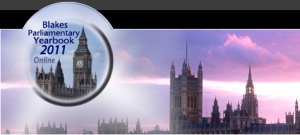
The Parliamentary Information Office of the Parliamentary Yearbook is currently gathering news items for major features in the next edition on the impact of alcohol abuse
A new £1 million fund to give local communities the tools they need to tackle binge and underage drinking was announced last month by the Government's Champion for Active Safer Communities, Baroness Newlove.
This came at the same time as the Government launched a brand new nationwide Change4Life campaign designed to expose the fact that drinking slightly over the lower-risk alcohol guidelines can seriously impact long term health. The TV adverts highlight that regularly drinking around two large glasses of wine or two strong pints of beer a day triple the risk of developing mouth cancer and double the risk of developing high blood pressure.
Figures today show an ever-growing cost of alcohol to the NHS which currently stands at £2.7bn a year, including £1bn on accident and emergency services. £2.7bn equates to £90 for every taxpayer in the country. This is part of a wider cost to society from alcohol of between £17 billion and £22 billion per annum. In 2010/11 alone there were 200,000 hospital admissions with a primary alcohol-related diagnosis, 40 per cent higher than in 2002/03. The number of patients admitted with acute intoxification has more than doubled to 18,500 since 2002/03.
The Prime Minister said early last month:
“Every night, in town centres, hospitals and police stations across the country, people have to cope with the consequences of alcohol abuse. And the problem is getting worse. Over the last decade we’ve seen a frightening growth in the number of people – many under-age – who think it’s acceptable for people to get drunk in public in ways that wreck lives, spread fear and increase crime.
“This is one of the scandals of our society and I am determined to deal with it. As figures today show the NHS is having to pick up an ever-growing bill – £2.7bn a year, including £1bn on accident and emergency services alone. That’s money we have to spend because of the reckless behaviour of an irresponsible minority.
“Across the country local hospitals, ambulance crews and the police are rising to the challenge. We must help them to do so and will be setting out how through the forthcoming Alcohol Strategy. Whether it’s the police officers in A&E that have been deployed in some hospitals, the booze buses in Soho and Norwich, or the Drunk Tanks used abroad, we need innovative solutions to confront the rising tide of unacceptable behaviour.
The announcement of the new fund came on the day Baroness Newlove published her latest report 'Building Safe, Active Communities: Strong foundations by local people', which is a collection of inspiring, yet practical lessons from those who are changing their neighbourhoods for the better, providing good advice, and highlighting some of the barriers that have stifled their growth. In her interim report to Government published in July last year, Baroness Newlove identified tackling problem drinking as her most urgent priority and she will continue to sharply focus on this in the months ahead. This new fund will give ten successful communities - based on models of grass roots projects already delivering for their neighbourhoods - the resources to really get to grips with problem drinking and deal with it, head on.
The Parliamentary Information Office of the Parliamentary Yearbook will report on the distribution of the fund and its success as this becomes evident.
This was submitted by the Parliamentary Information Office. For more information on the Parliamentary Information Office please visit http://parliamentaryyearbook.co.uk/contactus.html & http://www.parliamentaryyearbookinformationoffice.co.uk
